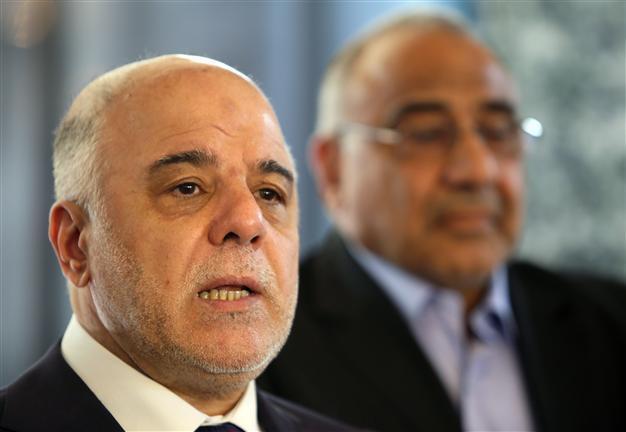Iraq PM says will ask US for more arms, strikes
BAGHDAD - Agence France-Presse

Iraqi Prime Minster Haidar al-Abadi speaks to the press at the airport in Baghdad before leaving to the United States on April 13, 2015. AFP Photo
Iraqi Prime Minister Haider al-Abadi said on April 13 that he will use a visit to the United States to seek increased air support and arms deliveries to aid Baghdad’s battle against jihadists.
“Number one is a marked increase in the air campaign and the delivery of arms,” Abadi told journalists when asked what he wants during a visit to Washington, where he is to meet President Barack Obama on April 14.
There has already been an increase, “but we want to see more,” he said before boarding his plane.
Abadi also said that “we want strict measures to stop the flow of foreign terrorists to Iraq,” and that international efforts are needed to curb oil and antiquities smuggling, by which the jihadists gain funds.
He is expected to request that Iraq be allowed to defer payment for arms purchases, given the country’s major shortage of funds due to a decline in oil prices and the cost of its war against the Islamic State of Iraq and the Levant (ISIL).
The United States is leading an international coalition that is carrying out air strikes against ISIL and also providing arms and training for Iraqi security forces.
The jihadist group led an offensive that overran large parts of Iraq last June.
Multiple Iraqi divisions collapsed in the early days of the jihadist-led drive, but Iraqi forces and allied paramilitaries have since succeeded in retaking significant territory from ISIL.
But pro-government paramilitaries have also carried out looting and burning as well as extrajudicial killings, raising concerns over the major role they play in the fight against ISIL.
Large parts of two provinces - Nineveh in the north and Anbar in the west – still remain under ISIL control.
Meanwhile, Iraq’s prime minister retired more than 300 officers as part of efforts to restructure the army, his office said on April 13.
Abadi “sent more than 300 officers at the defense ministry into retirement as part of a plan to reorganize the army and make it more effective and efficient,” it said.
The one-sentence statement did not provide details on the ranks and positions of the officers, or specifics on why they were removed from Iraq’s massive officer corps.
Abadi has removed army and police officers including senior leaders on several occasions, firing some and allowing others to retire, but this is the largest number to be sacked at one time.
